On March 10-11, 2016, IC-IMPACTS held its third annual research conference to great success. The two day event held in Vancouver was organized into multiple sessions featuring speakers from government, industry, academia, and community sectors. This year, the conference aimed to increase community impacts through partnerships and shared strategies on innovation and commercialization.


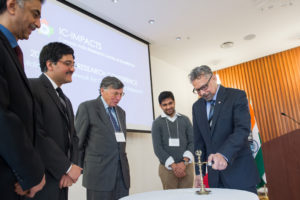


Setting the Stage for Innovation and Collaboration
The conference opened with an overview of Canada and India’s vision on innovation and collaboration. Consulate General of India Rajiv Chander provided an outlook of the areas in which Canada and India are currently collaborating well on and where potential opportunities exist. Meanwhile, Dr. Mario Pinto, President of NSERC, shared Canada’s 2020 vision on research and innovation. Canada plans to help foster a greater science and engineering culture by focusing on global research, creating universal researchers, and producing more social innovation through nonlinear engagement.
The progress of the 29 IC-IMPACTS projects was shared, highlighting several challenges and opportunities across the infrastructure, water, and public health sectors. Dr. Nemy Banthia gave an overview of the Centre’s nine infrastructure projects. The infrastructure theme has developed new sustainable materials, conserved and rehabilitated existing structures and performed health monitoring on several infrastructure projects. Dr. Madjid Mohseni highlighted the Centre’s 14 water projects, which are focused on the development of sensors and treatment systems for water and wastewater. Moving forward, the Water theme plans to add a health component to its projects by measuring outcomes resulting from project implementations. Finally, Dr. Stewart Aitchison briefed the conference attendees on the growing Public Health theme at IC-IMPACTS. The Centre is currently funding 6 projects in the health sector focused on the detection of Dengue virus, the development of portable devices, and the use of community engagement for increased public health.
Extending Impact Through Priorities and Connecting Strengths
Speakers from other research centres across Canada helped extend the impact of research by highlighting their strengths and unique approaches. Dr. Bernadette Conant, CEO of Canadian Water Network (CWN), detailed how after many years, the CWN transitioned from a technology solutions-based research centre to a hub for policy decisions and social change. Mr. Harry Sharma from Carleton University spoke about Carleton’s Canada-India Centre and the need for better multi-sector engagement. He noted that the Centre plans to host various expert roundtables in the near future and will be sharing their findings though published white papers.
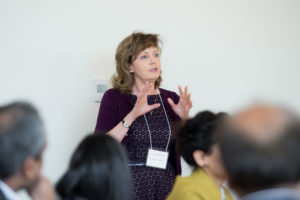
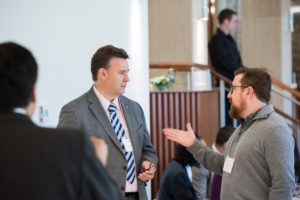

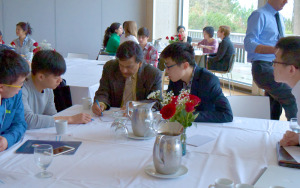
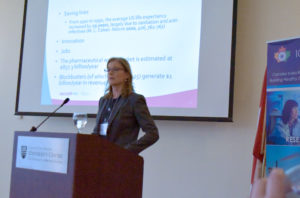 Accelerating Impacts Through Effective Commercialization and Innovation Practices
Accelerating Impacts Through Effective Commercialization and Innovation Practices
A significant challenge in research is translating innovative solutions into a commercial product. ACCEL-RX successfully fostered an environment for the creation of new health science companies in Canada and its CEO, Dr. Natalie Dakers, spoke on driving early-stage innovation and commercializing research. She stressed the importance of understanding industry needs and market opportunities. She also noted that a major key to her Centre’s successful industrial commercialization was having research validated by a third party.
Her talk created a great segway for an exciting and interactive roundtable discussion, as conference attendees brainstormed how to create a better culture for research accelerated innovation. The results of the discussion clearly showed that in order to create a better innovation culture, an increased understanding of community needs was required. More importantly, these community needs needed to be more accessible and shared across various stakeholder groups. The discussions also highlighted the need to enhance interdisciplinary research and to move away from individual studies in communities.
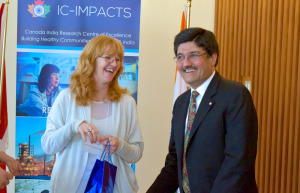
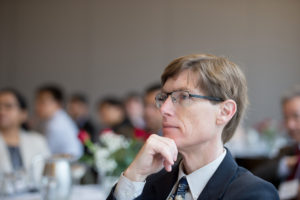
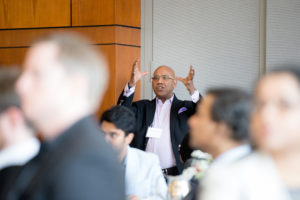 Partnerships for Impacts in Canadian Communities
Partnerships for Impacts in Canadian Communities
Focusing on community-wide impacts in Canada, Mr. Irving Leblanc, Special Advisor to the Assembly of First Nations, contextualized the previous conversations by providing stark water and infrastructure statistics in First Nation communities.
Over 130,000 housing units are needed in Canadian communities. Meanwhile, 157 drinking water advisories currently exist in 110 communities across the country. First Nation communities are in need of significantly better infrastructure and water.
Mr. Leblanc had a positive outlook on the future opportunities in First Nation communities, noting that a changing political landscape could immensely aid the water and infrastructure needs in First Nation communities across Canada.
Dr. Madjid Mohseni continued on this theme by showcasing the successful implementation of his water treatment technologies in Lytton First Nation. He attributed the success of the project to his community engagement approach – the use of community circles helped build a trusting relationship between community members and the research team. After the permanent installation of his innovative water treatment technologies, the community was taken off seasonal boil water advisory for the first time in many years.
Speaking on behalf of the British Columbia Construction Association, Ms. Helen Goodland shared a year long study that analyzed the provincial construction industry’s many nodes and recommended approaches for the industry to take to become a leader in construction innovation. Her in depth study touched on educational branding, prefab construction, and better use of computational power.
The construction industry needs to adopt Lean Construction, which is basically taking what Toyota learned about car manufacturing thirty years ago and applying it to the building industry. The intention is to have no inventory of materials on a construction site, workers should be leaning back for the next product they need and it should be put into their hand straight from the delivery truck.
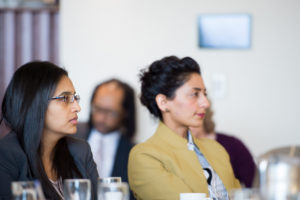
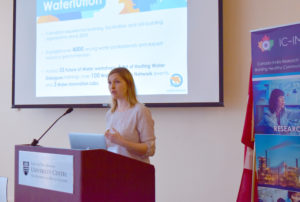
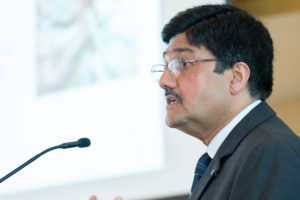 Partnerships for Impacts in Indian Communities
Partnerships for Impacts in Indian Communities
Shifting focus to community impacts in India, Dr. Nemy Banthia, CEO of IC-IMPACTS showcased the successful implementation of a new road using green technologies in Thondebhavi, India. The IC-IMPACTS project brought together partners across Canada and India to build a road that is 60% thinner than conventional roads in India thats uses significantly less carbon in its materials.
Dr. Amrita Daftary also shared her experience on the ground in India, working with pharmacists and communities to better diagnose tuberculosis in sick patients. Dr. Daftary is significantly decreasing major diagnostic delays through a “bottom up” community engagement plan consisting of publicity campaigns, counseling and support, telephone helplines, and training.
Ms. Karen Kun shared her experience in co-founding Waterlution and the company’s unique social innovation approach in creating water leaders around the world and training them for success. Waterlution’s next Innovation Lab will be taking place in India and will place the country’s water issues at the center of its workshop.
Priorities and Opportunities for the Future
In the conference’s final session, Ms. Val Walker, Director of Policy at Mitacs stressed that community consultation and growing partnerships drove successful opportunities at Mitacs. She also highlighted Mitacs new focus – by focusing on creating highly educated talent and increased business investment in research and development, Canada’s overall productivity would increase and the country would become more competitive in the global economy.
Canada is the number one place to do business within the G7 countries and the number two place globally for the ease of starting a business
Looking ahead, Dr. Nemy Banthia discussed the priorities of IC-IMPACTS over the next two years. Dr. Banthia noted that a key priority for the Centre will be the translation of research into community impacts. He also stated that the growth of the IC-IMPACTS network over the past three years has been an impressive achievement and is a strength that the Centre can build on. As the Centre continues to train professionals and build capacity, it will focus on moving from an initiative-based partnership to a continuous partnership model for extended impact.
In an interactive discussion, the network shared a significant interest to include other research areas such as energy, food security, and agriculture, as well as a significant interest for the Centre to create a pathway where demonstration initiatives can be expanded to include other countries facing similar community challenges.
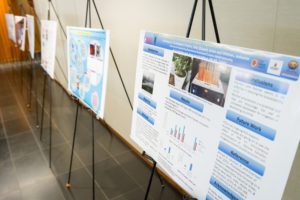

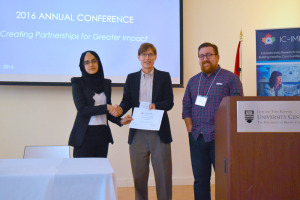
Student Poster Session and Networking
Prior to the conference, students on IC-IMPACTS projects took part in a research poster competition. Students across the Centre’s infrastructure, water, and health projects competed to present their work at the IC-IMPACTS Conference. Out of all the applicants, fourteen students were invited to the conference for opportunities to network and showcase their research poster, while six students were invited to present their research project to the entire conference audience. At the end of the conference, Zara Kharal of the University of Toronto was awarded the best presentation for her depth of research and clear presentation on Glass Fibre Reinforced Polymers (GFRPs).
The 2016 IC-IMPACTS Research Conference was a great success and highlighted various opportunities for advanced research, new partnerships, and community impact in both Canada and India. The diverse group of speakers and attendees created a very engaging environment and insightful environment. IC-IMPACTS would like to thank conference attendees for their participation.
2024 IC-IMPACTS Conference in Delhi December 9 - 11, 2024 New Delhi, India